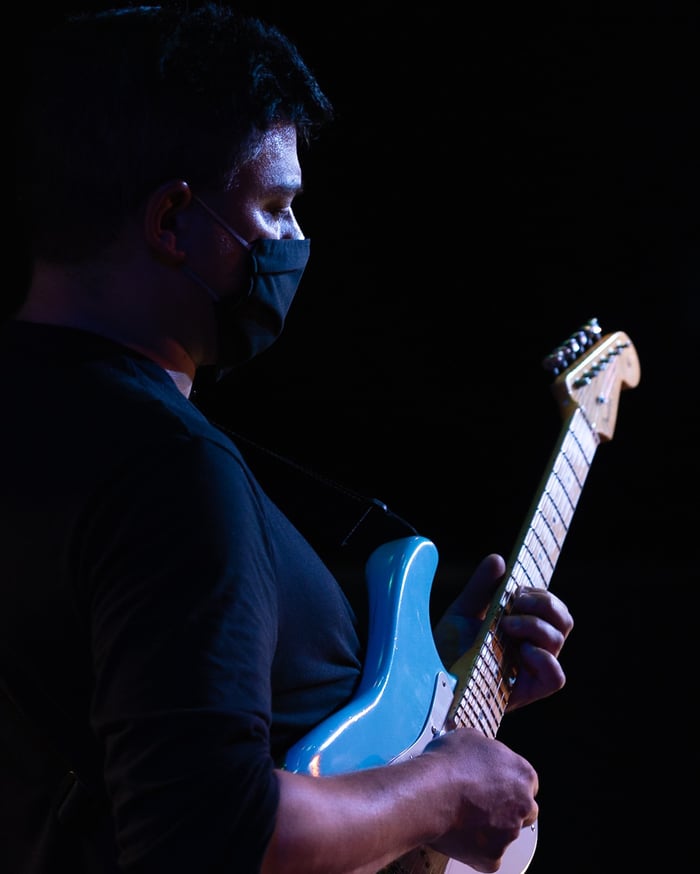Guitar | Vocals | Bass | Drums | Keyboard | Music Production
Best Music School for Montreal Musicians | The Music Career Opportunities are Endless





AIMM: A Premier Online Music Education Destination for Montreal Musicians
The Atlanta Institute of Music and Media proudly extends its Online Certificate in Music and Technology to the vibrant musical community of Montreal. Tailored to provide a practical, hands-on approach to music and technology education, this program is ideal for musicians seeking to advance their skills from the comfort of their homes.
Montreal musicians can choose to specialize in either Guitar or Bass within this online certificate program. Comprising 36 credits, the nationally accredited Online Music and Technology Certificate is fully transferable to the Associate of Applied Science in Music and Technology Degree, offering a seamless educational progression.
Financial aid options are available for eligible students, making this program accessible to a wide range of aspiring music professionals. Designed for intermediate instrumentalists, the program also encompasses essential knowledge in recording and engineering, skills crucial in today’s dynamic music industry.
Our online music classes are meticulously crafted to prepare you for the music industry's style, workload, and expectations. Whether you're a Montreal musician aiming to master your instrument or a producer looking to learn cutting-edge recording, mixing, and mastering techniques, AIMM's Online Music and Technology Certificate is the perfect choice for Montreal's emerging musical talents to unlock their creative potential.
Check out the video below for a taste of what AIMMLife is like, even for Montreal musicians outside of our Atlanta campus.
At AIMM, we are committed to providing our Montreal students with the tools and opportunities necessary for rapid professional growth. Our programs are designed to expand your musical repertoire and open doors to new career possibilities in the competitive music industry.
As a student at AIMM, whether you aspire to be a musician, producer, or live sound engineer, you will develop the confidence and skills needed to handle demanding and well-compensated roles. Our school programs are tailored to blend what you learn with your unique personal style, fostering a deep understanding of the industry while unlocking your creative and technical potential.
Key resources and benefits for our Montreal students include:
AIMM's approach is not just about imparting knowledge; it's about equipping you with the necessary skills and support to advance your career and achieve your musical aspirations.
For Montreal musicians looking to delve into music production, AIMM's online courses offer an invaluable opportunity. Beyond the choice of specializing in Guitar or Bass, our curriculum equips you with essential music production techniques, crucial for any aspiring music producer or DIY musician.
These skills include:
At AIMM, we focus on creating well-rounded musicians prepared for the music industry's diverse demands. This is a step above private music lessons. Whether your goal is to acquire substantial music production knowledge or to become a standout DIY musician in Montreal, our school music programs are designed to meet your needs.
As an AVID Pro Tools training partner, we offer specialized courses like Pro Tools 101 and Pro Tools 110, aligning with the most current industry standards.
These courses provide you with insider tips and practical techniques used by renowned music producers, enhancing your ability to create professional-quality music using tools like AVID Pro Tools and Ableton Live.
Embrace the opportunity to elevate your music production skills with AIMM, where you'll learn to harness the power of leading music production software and techniques.

If your passion lies solely in music production, AIMM has a fully online Music Production Certificate program to prepare you for a successful career. This program is a golden opportunity for Montreal-based music production students to master industry-leading production techniques right from home and also prepare them for a degree in music.
Our comprehensive online curriculum covers essential topics like Studio Acoustics Basics, MIDI: Sampling & Composition, Music Business, and Music Theory Basics. AIMM's program is meticulously designed to equip you with the knowledge and skills necessary for a thriving career in the music industry.
Key benefits of this program include:
For those in Montreal seeking a focused path in music production, AIMM's online program offers an unparalleled blend of industry-relevant training and flexible learning options.
If this sounds appealing to you, learn more about our online music production program today.
AIMM is incredibly proud of the success our alumni have found in the music industry. A few alumni we'd like to highlight include:
Kesha Lee - Engineer
Kesha Lee is an engineer who earned a Grammy for her work on Childish Gambino's song, This is America.

KEYZBABY - Producer
Jay Foye, aka KEYZBABY, is an AIMM alumni that co-produced the current #1 song in America, WAP.
Tosin Abasi - Animals as Leaders
Tosin is a phenomenal guitarist. He founded the band, Animals as Leaders, and even has his own line of guitars.
Some of the musical artists and companies our graduates have worked with:
Artists:
If AIMM seems like the perfect online music school for your skills and career goals, click here to begin your enrollment today.
One of the most appealing aspects of online music classes, especially for musicians and music producers in Montreal, is the unparalleled convenience they offer. Life's unpredictable nature, particularly in the music industry, demands flexibility, and AIMM's 100% online Certificate in Music and Technology meets this need perfectly. You can complete your music education from anywhere, adapting to your ever-changing schedule.
AIMM's online courses have a structured, "pre-packaged" syllabus, allowing you to plan your educational journey effectively. The independent nature of the coursework means you can progress at your own pace, fitting study and practice sessions around your commitments. This self-directed approach is ideal for disciplined individuals who excel in creating and adhering to their own structured learning plans.
Choosing an online program also means avoiding additional expenses typically associated with on-campus education, such as room and board or meal plans. Your investment goes directly into your education and experience, without unnecessary extras. Additionally, the savings in commute time and costs, though seemingly small at first, can significantly accumulate throughout your program.
AIMM's online programs offer an ideal blend of convenience, independence, and cost-effectiveness for Montreal musicians seeking a comprehensive, flexible, and financially sensible music education.
If your application is accepted, you'll be required to complete an entrance exam and submit a video submission.
Put some clear and concise content in here. Keep your reader in mind. What are they trying to do? What are they hoping to learn? Why are they reading this? Help them out and use the tone and voice of your organization.
When you graduate from AIMM, career opportunities include:
We currently offer two (2) entirely online programs, our Online Music & Technology Certification with a focus in Guitar or Bass.
The rest of AIMM’s programs are Hybrid programs, meaning that certain classes can be taken online, while others will require you to come on-campus.
*Online course availability and options subject to change due to COVID-19.
Yes, AIMM’s studios and computer labs are outfitted with all the hardware and software required to complete students’ coursework.
AIMM also offers the purchase of an additional “Tech Kit". The "Tech Kit" is not included in the cost of tuition, it is an optional expense if a student would like to outfit their home workspace with our suggested hardware and software.
The purchasing of the Tech Kit is handled through a third-party website called Vintage King.


Attending music schools like AIMM provide a unique and captivating music environment. If you want to enroll in the best school for Montreal musical artists, it is important that you bring the following items to your admissions counselor or the registrar before you start classes:
Canadian Student Checklist
If you attended any high school, college, or university outside of the United States, you must have your education credentials evaluated and verified by a NACES member evaluator and sent directly to AIMM. Any costs incurred by such an evaluation are the responsibility of the student. SpanTran is our recommended international transcript evaluation service. They have created a custom application for Atlanta Institute of Music and Media that will make sure you select the right kind of evaluation at a discounted rate. You can access their application here.
Learn more about attending AIMM's campus below:
| Course Number | Course Title | Credits | |
| BAS/DRM/GTR/KEY/VOC130 | Reading I This course is designed to introduce and develop the skills required for sight reading of chords and single note melodies on the guitar. Beginning in the open position, students will read etudes, duets, and chord charts for each class session. By the end of the quarter, the Toronto student in Reading One should be able to read up to the second position in a variety of styles and rhythmic patterns. |
1 | |
| BAS/DRM/GTR/KEY/VOC230 | Reading II This course is designed to develop the Toronto student’s ability to read in various positions on the neck. Beginning with the second and third positions, you will read etudes, duets, and chord charts for each class session. By the end of the quarter, students will be required to read single note melodies up to the seventh position and a variety of styles of chord charts. Prerequisite: GTR130 Reading I. |
1 | |
| BAS/DRM/GTR/KEY/VOC120 | Scales I / Technique I Application of scales and arpeggios, taught within the context of the corresponding Performance class selections, with a focus on playing the changes with major and minor dominant blues. If students want to make music, Scales lessons are integral. Topics covered in Technique/Scales One: major scales with corresponding diatonic chords and arpeggios, major pentatonic, major pentatonic with flat 3, blues scale, natural minor, mixolydian mode.. |
1 | |
| BAS/DRM/GTR/KEY/VOC220 | Scales II / Technique II Scales II explores the melodic minor scale in depth: modes, arpeggios, and sequences. The class also explores uses of symmetric scales. You are expected to play regularly, demonstrating not only knowledge of the scales, but also knowledge of how to use those scales to create music. Prerequisite: Scales I |
1 | |
| Number of Instrument-Specific Credits Required | 4 | ||
| Course Number | Course Title | Credits | |
| INT100 | Performance I This course is an interdisciplinary live performance class based on standard introductory level repertoire for R&B, Blues, Rock and Pop styles. You will perform on stage weekly in a live interactive ensemble format with voice and rhythm section instrumentation that emulates professional gigging scenarios. The emphasis is on execution of melody, rhythm, chords, form, and improvisation. Materials such as sheet music, charts, play along tracks, lyrics, video tutorials are provided via Canvas Learning Management System.. |
4 | |
| INT200 | Performance II This course is an interdisciplinary live performance class based on standard intermediate level repertoire for R&B, Blues, Rock and Pop styles. You will perform on stage weekly in a live interactive ensemble format with voice and rhythm section instrumentation that emulates professional gigging scenarios. The emphasis is on execution of melody, rhythm, chords, form, and improvisation. Materials such as sheet music, charts, play along tracks, lyrics, video tutorials are provided via Canvas Learning Management System.. Prerequisite: INT100 Performance I. |
4 | |
| INT145 | Music Theory Essentials I This class covers the basic elements: ear training and notation. Diatonic harmony, major and minor key signatures, triads and 7th chords, scale harmonization, meters, basic rhythmic notation, and chord symbol conventions. You will practice recognizing fundamental musical elements by ear. Basic keyboard skills will be covered, which includes: chords, scales and reading. |
3 | |
| INT245 | Music Theory Essentials II This class focuses on scales, modes and linear structures needed for improvisation and melody. Ear training and dictation of melody and diatonic chord progressions are covered. Advanced notation concepts, which includes: form, articulation and syncopated rhythm are included. Harmonic concepts are practiced and reinforced using keyboard. Prerequisite: INT145 |
3 | |
| INT495 | Music Business Presenting concepts and practices that cover several areas of the constantly changing music industry. Students will learn about such things as booking, agency contacts, performing rights organizations, copyright and trademark, record label anatomy, artist management agreements, tax information, resume and self-promotion. |
1 | |
| Number of Interdisciplinary Credits Required | 15 | ||
| Course Number | Course Title | Credits | |
| RCD100 | Pro Tools 101 This course introduces basic principles a student needs to understand how to complete a Pro Tools project, from initial setup to final delivery, and to take the Avid Pro Tools 101 User Certification exam. Topics include purposes and uses of edit tools, modes, various track and signal clip functions for recording, editing, and importing audio, MIDI, and video used for music and media production. Included with the course textbook are media files for Pro Tools 101 exercises and hands-on projects. |
2 | |
| RCD130 | MIDI: Synthesis & Sequencing This course is an introduction to the MIDI language, using Ableton Live and Native Instrument’s Komplete Bundle as the vessel of instruction. This course demonstrates core concepts such as the basic MIDI environment, sequencing, sampled-based and synthesis instruments, automation, and final steps for MIDI-based production, such as mixing and effects processing. : |
4 | |
| RCD140 | Introduction to Audio Production I This course gives the student an introduction to, and a strong foundation in, audio production techniques, such as an introduction to analog recording history, physical properties of sound, basic microphone types, recording environments, mono & stereo microphone techniques as well as basic analog signal flow & analog signal processing, which includes equalization and dynamic processing techniques. |
3 | |
| RCD200 | Pro Tools 110 This course builds on the introductory Pro Tools 101 course, evolving basic Pro Tools principles while providing the student with the essential processes needed to complete a Pro Tools project, from initial set up to final mixdown, and to take the Avid Pro Tools 110 User Certification exam. The course teaches intermediate Pro Tools techniques, covering key concepts and skills needed to operate a Pro Tools system. Topics include Hardware I/O setup and routing, Elastic Audio, internal Bus path usages for send/returns, automation, and more. Included with the course textbook are media files for Pro Tools 110 exercises and hands-on projects. Prerequisite: RCD100 Pro Tools 101 |
2 | |
| RCD240 | Introduction to Audio Production II This course gives the student a more advanced introduction and foundation to audio production techniques including principles of analog & digital audio production and recording and data storage and playback media for digital audio formats. The student will gain an advanced understanding of large format analog console signal flow, time-based processors and an introduction to plug-in processing. Prerequisite: RCD140 Introduction to Audio Production I |
3 | |
| Number of Recording Technical Credits Required | 14 | ||
| Course Number | Course Title | Credits | |
| SCI120 | Physics of Sound This course introduces the physical nature of music and sound. Waves, sound propagation, harmonic content, the human hearing mechanism and musical instrument tone production are discussed. Psychoacoustics and perception of sound are included |
3 | |
| Minimum Number of General Education Credits Required | 3 | ||
| Certificate in Music and Technology (Online) - Total Credits | 36 | ||

- The Council on Occupational Education
- The Georgia Nonpublic Postsecondary Education Commission